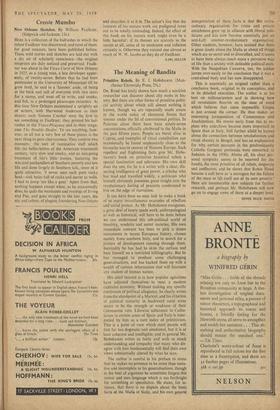Creole Mumbo
New Orleans Sketches. By William Faulkner. (Sidgwick and Jackson, 15s.)
HERE is a collection of the bulrushes in which the infant Faulkner was discovered; and most of them, for good measure, have been published before. These mild stories and sketches are laid out with a shy air of scholarly conscience—the original misprints are duly noticed and preserved. Faulk- ner was about in the Vieux Carre of New Orleans in 1925, as a young man, a late developer appar- ently, of twenty-seven. Before that he had been postmaster at the University of Mississippi till he grew tired, he said in a `famous' aside, of being at the beck and call of everyone with two cents for a stamp, and went off to write, and smoke, and fish, in a prolonged picaresque existence. At this time New Orleans maintained a sprightly set of writers, with Sherwood Anderson as their doyen; such `famous Creoles' were the first to see something in Faulkner; they printed his bul- rushes in the Times-Picayune and in their maga- zine The Double Dealer. To see anything, how- ever, in all but a very few of these pieces, is the next thing to pure clairvoyance. They contain two manners: the sort of ruminative stuff which fills the belles-lettres of the American nineteenth century, very slow and smoky, and an easygoing treatment of life's little ironies, featuring the wits and panhandlers of Southern poverty and low life and done largely in Southern talk, some of it quite attractive. 'I never seen such pore rocky land—sink holes full of rocks and narrer as wells. I had to jump 'em like a goat.' Apart from that, nothing happens except when, as he occasionally does, he quits the waistcoats and musings of Irving and Poe, and goes straight to the late years, the stir and colour, of elegant, foundering Noo Orluns
and describes it as it is. The editor's line that the interests of his mature work are prefigured turns out to be totally misleading. Indeed, the effect of this book on his mature work might even be a little harmful: if its themes are scarcely in the stories at all, some of its smokiness and inflation certainly is. Otherwise they remind one almost as much of W. W. Jacobs as they do of Faulkner.
KARL MILLER














































 Previous page
Previous page